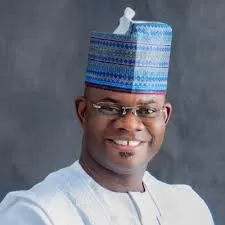
BREAKING: EFCC ARRESTS YAHAYA BELLO
The Economic and Financial Crimes Commission, EFCC, has finally arrested the immediate past Governor of Kogi State, Yahaya Bello, as he honoured the invitation of the Commission over alleged misappropriation of funds.
Bello went to the anti-graft agency’s office with his lawyers on Tuesday morning.
This followed the Supreme Court judgment which dismissed the suit filed by the states to challenge the constitutionality of the anti-graft agency.
The former governor drove himself in a black Toyota Hilux to the EFCC office with his lawyers.
At the last hearing on November 14, the EFCC had sought for adjournment till November 27 in the fresh case it instituted against Bello, saying that the 30 days window was still running for the summons earlier issued.
 Premium News
Premium News